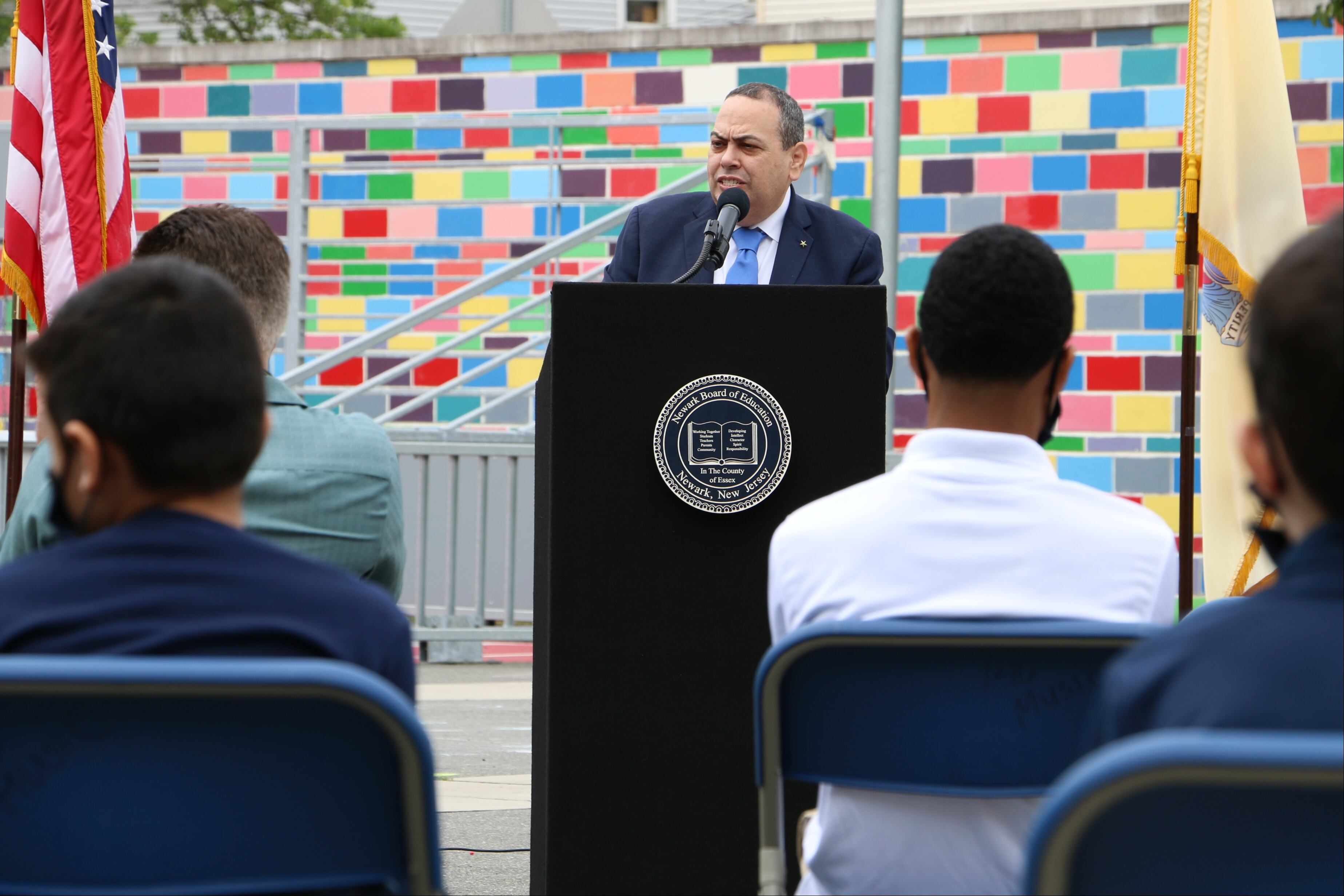Sign up for Chalkbeat Newark’s free newsletter to get the latest news about the city’s public school system delivered to your inbox.
New Jersey’s biggest school district, which gets more than $1 billion in state aid every year, pulled a sharp reversal by extending its superintendent’s contract in the middle of the night without public comment.
Hiring a superintendent may be the most important decision that a school board makes, but this decision wasn’t put on the public agenda. A board member who had abstained in September when this extension to 2030 was rejected said she’d had a change of heart and decided to vote yes, flipping her position to make a majority.
Why this urgency, with more than two years remaining on Roger León’s current contract?
It’s a question no one will answer – not the school board, not the mayor, not the state, and not León. That silence, along with the unusual procedural move that made this possible, has left critics outraged, charging that this was a backroom stunt designed to keep the public out of the discussion, a throwback to the days when the state ran the district from Trenton.
“You fight so hard as a community to get local control back, just to see the power not even be exercised,” said former South Ward Councilman Oscar James. “Americans are fighting to put food on the table and we’re talking about a man guaranteeing himself another two years, when we’re not even two years out from the end of this contract. It seems ridiculous.”
León was appointed superintendent in 2018 and has enjoyed solid support from the board. His standing in the community is harder to gauge. Turnout in school elections is at 3%. And students have struggled, with only 34% reading at grade level and 21% proficient at math, well below the average in the charter schools, which educate more than 1 in 3 Newark kids. Still, district scores have improved in recent years under León, as has the graduation rate.
But the board, which employs the superintendent at an annual salary of $319,785, has very little leverage, critics argue, and this last-minute contract extension is a prime example.
Board members “deliberately vote against the interests of the community,” said Ade Kelly, a former Newark school board candidate. “They empower the superintendent to act as if he’s the boss of the public school district, when they are his boss.”
“I didn’t understand the urgency,” said Vivian Cox Fraser, president & CEO of the Urban League of Essex County. This superintendent had just gotten his contract renewed, she noted. So why such haste, without public notice?
“If I was aware of it, I would have probably tried to galvanize some people to go to the meeting and speak out against it,” said a recent city council candidate, Jhamar Youngblood. “That’s our culture in this city, to do backroom deals and not let residents and community activists know truly what’s going on.”
This board has no teeth to rein in a superintendent who acts like “a czar,” said Lamont Vaughn, a community activist who called these tactics very similar to what the city went through under former Superintendent Cami Anderson’s “regime” a decade ago, when the state had control.
“Just in a different name, a different color, and with a different mantra: That being, ‘Roger León is from Newark.’”
Top officials have no comment
Meanwhile, the people with the most political influence in the schools have all clammed up: State Sen. Teresa Ruiz, who represents Newark, Mayor Ras Baraka, and Councilman Anibal Ramos, all respected voices on education, are not commenting. Neither is the state Department of Education.
Critics note that the board member who switched to a yes vote, Melissa Reed, has a job with the county, and some suspect that may have influenced her vote. Reed did not respond to a request for comment and a spokesman for the district called any suggestion of impropriety “baseless, outrageous and insulting.”
“Everyone is connected to somebody or has some job that can be waved in their face, and their livelihoods can be put up against them, and they have to make decisions based on whatever the powers that be decide,” said Kelly, the school board candidate. “That’s really unfortunate.”
The board president, Hasani Council, had to abstain from this vote because of a nepotism conflict himself: His father works for the district. Council later insisted through a district spokesman that Reed “did not discuss her decision to change her vote with the board president or the superintendent before last night’s meeting.”
Kelly is not convinced. “What this looks like,” he said, “is that some folks had some conversations with her behind the scenes and she had to change her vote.”
Reed demanded one concession in return for her vote, a public commitment from the superintendent to release a report on the Newark School of Global Studies high school, which has been the subject of racism allegations, follow its recommendations, and improve transparency, among other issues. León did not give one. Yet she voted to extend his contract anyway, Chalkbeat reported.
The move on this contract, and the way it was done, has offered a ripe target to critics of the state’s funding system, which is heavily weighted in favor of urban districts like Newark.
“The wanton disregard by the Newark school board for just the base level of normal, ethical, transparent behavior is amazing,” said Sen. Declan O’Scanlon, a Republican, who notes that other districts are being forced to lay off teachers.
To speak at a Newark board meeting as a member of the public, you need to sign up five days in advance, he noted. The failure to put this late-night renewal on the agenda violates the spirit of the law requiring 30 days public notice, at least, and perhaps the letter of the law, experts say.
Superintendent contract extension has been target of criticism
Three years ago, León’s contract was automatically renewed with no public notice, and parents and activists loudly protested when they found out eight months later. When this latest extension was up for discussion in September, public reaction was mixed.
Critics point to low scores on state tests last spring: Only about 34% of Newark students are reading at grade level and 21% are proficient at math. Those scores have improved slightly, each by roughly three percentage points over the previous year.
The state designated Newark as “high performing” over the summer, but notably, some of the worst scores it got on that evaluation were for academic performance. While student test scores have been steadily improving since the pandemic, they started at a very low point, according to Paula White, executive director of JerseyCAN, who was formerly in charge of turning around failing schools for the state department of education.
Meanwhile, the district has been criticized for spending lavishly: Travel to conferences in places like Puerto Rico and Hawaii. Millions spent on legal battles with a charter school over a building the district sold years ago and is now trying to claw back with a failed lawsuit that a judge called “shameful.” And a “fun day” party for hundreds of main office staffers, an expense the state flagged as a violation, forcing the district to reimburse the state.
Parents complain about being left in the dark about secretive contract renewals and key reports while the district awards itself the highest possible scores on self-evaluations and what critics call deceptive advertising: For instance, at Chancellor Avenue School, where 80% of the kids can’t read on grade level, the district hung a banner declaring it a “Rising Blue Ribbon School.”
“We should be facing our problems head on instead of trying to mask them in these celebrations,” Youngblood said.
Now, among those crying foul is an expert who advises the National School Boards Association on procedure, Bruce Bishop, who called the Newark board’s justification for this late-night contract extension “simply incorrect.”
“They do this because they know they’re not going to get checked,” said Thomas Luna, a former Newark school board candidate. “For quite some time, our board has made decisions that are not aligned with policy and procedures because there’s no repercussion.”
And there’s plenty of blame to go around for that, O’Scanlon says.
“It’s incredible that the Murphy administration has not clamped down on them. It’s malfeasance,” he said. With Democrats still in power in Trenton, he adds, “it will be four more years of the same: Flushing New Jersey taxpayers down the drain of the Newark school system.”
Any member of the public who objects to this extension can file a complaint with the state ethics commission, the state department of education, or in state Superior Court, experts say. But if the board hasn’t done things properly, it shouldn’t be up to the people to fix it, said Fraser of the Urban League. It would be simple enough to just follow the law, provide notice, and hold another hearing.
“I would hope,” she said, “that the other board members who’ve been elected by the residents of Newark to represent the best interests of the children of this city would want to do what’s right.”
Julie O’Connor is the urban education writer at NJ Spotlight News. Email her at OConnorJ@njspotlightnews.org.







